
Interview with Ross Brawn
Atlas F1 GP Correspondent
It is impossible to talk about Michael Schumacher's success without mentioning Ross Brawn, a man who has been pivotal in all of the German's four world titles and a more than possible fifth. Brawn's leadership, technical knowledge, and an almost supernatural skill when it comes to planning race strategies have, combined with Schumacher's driving ability, helped them enjoy an unprecedented success. Will Gray talked to Ferrari's technical director about his life in F1, about his success, about Schumacher, and much more. Exclusive for Atlas F1
Recognised as a master strategist, Brawn has grown a reputation through gambling on tactics and getting them absolutely right. The team's one-two victory in the last race, in Britain, was just one example of perfect timing which saw the team get ahead as their rivals were left in a muddle.
But Brawn is much more than that. Apart from five years working with the Atomic Energy Research Establishment, he has spent his entire career in motor racing and, like his star driver Schumacher, truly proved his talent in sportscars, ironically at around the same period of time as the German was doing exactly the same thing.
In early 1991, while Schumacher was racing a Mercedes around the FIA World Sportscar Championship circuit at the age of 22, Brawn, then 37, was the chief designer for one of their rival teams, Jaguar. Schumacher moved to Formula One in the middle of the year, having won just one race in Japan. Brawn, however, won the championship for Jaguar.
He had already been in Formula One before, entering the sport with Williams at the age of 22. He spent eight years there before moving to the now-defunct Force team as chief aerodynamicist, and then Arrows, as chief designer, in 1987. It was there where he began an important link with Tom Walkinshaw and became head of race car design at the entrepreneurial businessman's TWR company.
Brawn's success in that area saw him drawn back into Formula One for a second stint in July 1991, with Benetton and TWR. Schumacher's comparably noticeable talent saw him follow just one month later, when he was plucked from the Championship to join the Jordan team.
Like Brawn when he entered the pinnacle of the sport, Schumacher was 22, and supremely talented when he made his debut at Spa-Francorchamps. So impressive was the young German's debut that Benetton boss Flavio Briatore and Walkinshaw snapped him up for the very next race. And so Brawn and Schumacher began their long and successful partnership.
Together they worked to their first Formula One victory at the Belgian Grand Prix in 1992 and, two and a bit years later, they had won their first title, when Schumacher controversially took out rival Damon Hill to secure the Championship at the season-ending Australian Grand Prix in 1994.
After another Championship the following year, Schumacher left Brawn and Benetton for the dream Ferrari drive at the start of 1996. But it soon became clear that the sum of the pair was greater than the individual talents of the two parts. At the end of that year, Williams, associated to neither Brawn nor Schumacher, had moved into the ascendancy.
Schumacher finished third in the Championship with 59 points for his new Italian team, 38 points behind title winner Hill. Brawn's Benetton team, meanwhile, finished third in their Championship, and with 68 points were 107 points behind winners Williams.
The 'Dream Team' was developed through the following years, but Brawn does not see himself as a kingpin in the grand plan. He knows there is more to Ferrari than the front men - and he makes sure the team knows they are all important.
"It is something that we tell them all the time that they are an intrinsic and vital part of the success of Ferrari," said Brawn. "A lot of the guys have been there 20 or 25 years, they have been through some very tough times, and they are now getting the rewards for the hard work they have done. They are a vital part of our success and every individual that works for Ferrari plays a very important role.
"You have several hundred people working behind the scenes to achieve that success and every person's role is vital. If one individual, for instance a chap working in the inspections department, doesn't see a problem with a component and that component goes on the car and the car fails then that is a race lost, so everybody is vital.
"Obviously there are some people in Ferrari who have a higher profile than others," he continued, clearly suggesting himself for one. "But around 90 percent of my time is away from the racetrack. I am responsible for the manufacturing at Ferrari, so my role is really two different roles. When I come to the racetrack, I perform the role often you see here, and then I go back, have a series of meetings and discussions to get the cars designed."
And Brawn believes that like himself, Schumacher is also a vital part of that team-building experience. The German, like his Colombian rival Juan Pablo Montoya, regularly pays visits to his team's factory to get involved and he takes as much time out as he can to develop relationships.
Teamwork, of course, has always been a part of Ferrari, and it was most noticeably seen at the Austrian Grand Prix when the whole problem of team orders reared its ugly head. The FIA admitted they could not find a solution, fined Ferrari $1 million for incorrect podium procedure, and left it at that.
So, what does Brawn think about the whole team orders situation?
Brawn: We have no pre-determined team orders apart from the fact that we don't want the drivers to end up knocking each other off.
Q: But are the drivers not skilled enough drivers to be allowed to race?
Brawn: It is an argument, and it is an argument that may evolve in a different way towards the end of the season.
Q: So why not let them race now?
Brawn: At the moment with that sort of advantage we don't want to waste it and we would look very silly if two cars were in the gravel trap having been first and second and in the last five laps they both ended up off the track. That would be very frustrating and at this stage of the season it is something we do not want to do.
Q: But with Barrichello showing such strong performances, why can't he just be allowed to take on Schumacher?
Brawn: I have been really pleased with Rubens' performance this year. We saw the signs of that quite early on and that is one of the reasons why we were happy to renew his contract. But when you have such a lead you have got to be careful not to over-stress the equipment.
Q: So have Barrichello's recent performances rattled Schumacher?
Q: It must help having two drivers both on the pace, doesn't it?
Brawn: Yes. Being much closer they can look at their set-ups, they can look at areas of the track where one is quicker than the other and they can learn from it. So, in fact, there probably are some benefits from Rubens being closer than Michael, but I don't think it's Michael trying harder, I think that it is just that Michael and Rubens just now have better information to compare.
But, whatever side you take on the team orders debate, the fact is that Ferrari are now so dominant because of the work of Todt, Brawn, Rory Byrne, Paolo Martinelli, Schumacher, Barrichello et al, that they can arrange the races however they like - whether fans like it or not.
If Schumacher finishes this weekend's race, then he will complete a full set of 17 races since his last failure to reach the chequered flag, at his home race in Germany last year, and the reliability of the new F2002 machine is, perhaps, even more astonishing.
The Italian team's latest car was introduced for Schumacher in Brazil, the third race of the year, and then made available for both drivers at the following race, in Imola. Of the 15 times it has been entered in a race, it has only failed to finish once. That nature of emphasis on reliability has, says Brawn, been present at Ferrari ever since he arrived - and he believes that is the key to the team's astonishing success.
Brawn: Ferrari had a very good quality control system when I arrived and we have strengthened that and improved that. There are strategies, there are approaches you can take with the car and you don't always finish the race with a car working at 100 percent.
Q: What strategies are they?
Brawn: Often you have little problems and you have to have systems to take care of that. We have a lot of recovery systems built into the cars and if something goes wrong we can keep racing, we can keep running. Sometimes they are working and people don't realise.
Q: So how many races have you won when the car was not 100 percent this year, then?
Q: But all the other teams must have these strategies too, so why is Ferrari's reliability so good?
Brawn: I think a lot of it is culture and philosophy that any little problem we have we hit at 200 percent, because you cannot afford to have the slightest problem. All of our people understand that the slightest problem has to be dealt with with the maximum effort.
Q: The amount of testing that you do must help too?
Brawn: Yes, it often throws up problems but two or three races ago we had a little problem with the gearbox again and SKF, who are a very big company, they are not necessarily, let's say, built for it, but within a week they manufactured new bearings to fix this problem in the gearbox and that takes a tremendous effort from a company like them. To create a completely new design in one week...that is the sort of effort that Ferrari and its partners make to try and ensure reliability.
Brawn begins to recall the great designer Colin Chapman, of Lotus, who was renowned for getting his cars right on the limit, ensuring they won the race but went little further. "The first thing you have to do is win a race," he said. "Every effort firstly goes into that and then secondly performing as well as you can in that race.
"We are not quite as clever as Colin Chapman. We can't judge it that accurately, but our cars are built for 400 kilometres. That is what we build a racing car to do, and there are components on the car that after they have done the morning warm-up and the race, they are scrapped. So the car is fairly finely tuned to complete 400 kilometres."
The team introduced a new gearbox this year designed closer to the limit than ever before, and they now use two of them each weekend, one for practice and one for the race. The clutches are changed every day as is the engine, while brakes are changed two or three times a weekend.
Brawn: It is difficult for us to judge. You can only do your own programme, but you do react to what the competitors are doing and to what is happening. If someone is beating you then you put more effort into performance. If you are beating others, then you put a little bit more effort into reliability, so there is an inevitable reaction from what is going on around you.
Q: But you must know you are extremely well advanced on your competitors?
Brawn: Well, we are building our new car and we have set a target. We don't believe it is worth building a car unless it is a reasonable amount faster than the old car.
Q: Is that why the F2002 had a delay in its introduction, because you did not believe it was a reasonable amount faster?
Brawn: You saw at the beginning of the season we weren't ready with this car because at the time we had to make the decisions it wasn't a big enough improvement over the car we had. We have set those same objectives for the new car.
Q: So how far down the line is next year's car?
Brawn: We are pretty much committed to next year's car now, in fact it started much earlier in the season.
Q: When?
Brawn: March time we started to think about the new car once we had the old car running and then some of our group then move onto the new car and more and more of our group then join the new car project as the year goes on.
Q: So what level of participation is there on the new car now?
Brawn: Certainly, from an aerodynamic point of view, all our resources are now behind the new car. But some of the aerodynamic group started on the new car in March as soon as the car we have now was running. We have to maintain the reliability, we can't get complacent, but we have been able to put more resources behind next year's car at this stage of the season than we were able to do last year.
Brawn has now been back in the game, in his second stint, for more than 10 years, most of those working with Schumacher. It is, therefore, easy to see how the team are so successful. And looking deeper into the mind of Brawn, it is also easy to see how the Englishman's motivation keeps him going.
This year's Championship will actually be Brawn's sixth - he is one ahead of Schumacher because Ferrari won the 1999 Constructors' Championship when Mika Hakkinen won the drivers' title after Schumacher broke his leg. Had it not been for that Silverstone accident, they would both, probably, be on the same level.
Like Schumacher, Brawn was introduced to racing by his father at an early age, because Mr Brawn Senior worked for Firestone when his son was just a little guy wanting to become as successful as the top drivers of the era. Engineering, says Brawn, was never even a contemplation.
"My father used to take me to races and they were the days of Graham Hill and Jim Clark," he said. "There was a lot of admiration for those sort of people and it was only later that I became interested in the engineering. But I have been lucky to work on a lot of great cars, the Williams FW07 was a fantastic car and we have done one or two Ferraris now which I hope are thought of historically as very good cars, so I have got a lot of favourite cars."
Brawn is easily noticeable as English, despite spending the last six years in Italy. There is not even a hint of Italian speech dimming the well-spoken voice of this English gentleman as he discusses his past and mulls over what could happen to him in the future.
He returns to England once or twice a month, but has a home in Italy where he lives with his wife Jean and their two daughters Helen and Amy. Not that they are going to be around for long, as Brawn admits "they don't need us so much" now they have left the nest.
Brawn's personal side is something that rarely comes out as the professional and politically correct mask of Ferrari hides the real man living behind the Italian team's corporate image. His only break with protocol, it seems, is his determination to eat bananas on the pit wall.
"That seems to be a popular topic," he said after the habit was noticed as cameras now more regularly focus on the team on the pit wall to check for signs of team orders. "I always eat bananas on the pit wall - I find I have to have something to do during the race when it gets a bit quiet."
It is, quite frankly, astonishing to think the master strategist has time to sit and munch on fruit as his long-time colleague Schumacher races around lap after lap at high speed and with high concentration on the way to win after win.
Winning is, like motor racing, certainly in Brawn's blood, even if that trait grew through Schumacher as the nineties moved into the next century. But boredom is something Brawn has little time for, and he is flummoxed by the final question as the interview draws to a close.
Q: Given the freedom to design anything, what would a Formula One car look like?
Brawn: Really we don't think in that direction, we work within the envelope of the regulations so I can't remember the last time I thought what sort of racing car we would design if we didn't have the regulations. But I think that if there were no regulations we would have cars that drivers couldn't drive.
Q: What, even Schumacher?!
Brawn: I think the cornering potential of the cars would be so high that any driver simply couldn't drive them any more. I am sure we could have achieved that if the regulations hadn't placed constraints. The main constraints have been applied to the aerodynamics and if they were free then that is where the performance would come from.
Q: So do regulations annoy you?
Brawn: It is all part of the game that you have these regulations and you have to beat them within the regulations.
And Team Ferrari have certainly shown they can play that game.
World Champion Michael Schumacher could secure the fastest ever World Championship victory in history if he wins his record-equalling fifth title at the French Grand Prix this weekend, but it is well recognised that his success is as much down to the team around him as to his own supreme talent.
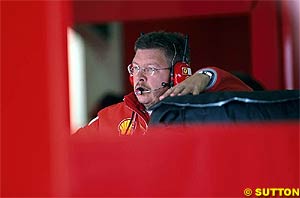 Looking back through history, it is clear that Schumacher is one of the best racers in the world. But behind every great champion has been a great designer and Briton Ross Brawn, Schumacher's right-hand man, can now be placed firmly in that category.
Looking back through history, it is clear that Schumacher is one of the best racers in the world. But behind every great champion has been a great designer and Briton Ross Brawn, Schumacher's right-hand man, can now be placed firmly in that category.
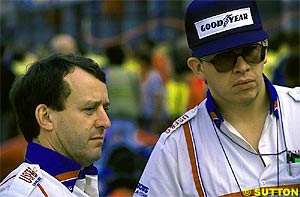 That position led to Brawn's creation of the highly-respected Jaguar XJR-14 car, which wiped the floor with the opposition in the World Sportscar Championship, effectively reducing Schumacher's success in the process.
That position led to Brawn's creation of the highly-respected Jaguar XJR-14 car, which wiped the floor with the opposition in the World Sportscar Championship, effectively reducing Schumacher's success in the process.
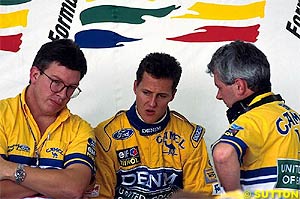 It was not long before the pair were re-united, when Brawn moved to Ferrari at the end of that year and, with team boss Jean Todt at the helm and chief designer Rory Byrne, who was with Brawn and Schumacher at Benetton, also part of the team they began to construct what would become an almost unbeatable force.
It was not long before the pair were re-united, when Brawn moved to Ferrari at the end of that year and, with team boss Jean Todt at the helm and chief designer Rory Byrne, who was with Brawn and Schumacher at Benetton, also part of the team they began to construct what would become an almost unbeatable force.
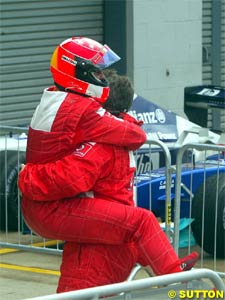 "Michael makes a big effort," said Brawn. "I have often said that Michael, as well as being a fantastic driver has been a very good catalyst for Ferrari because he has made the effort, very often, to come to the factory and meet the people. When we have won the Championships Michael has spent a lot of time to personally thank them for their efforts. He recognises very much that it is a team effort."
"Michael makes a big effort," said Brawn. "I have often said that Michael, as well as being a fantastic driver has been a very good catalyst for Ferrari because he has made the effort, very often, to come to the factory and meet the people. When we have won the Championships Michael has spent a lot of time to personally thank them for their efforts. He recognises very much that it is a team effort."
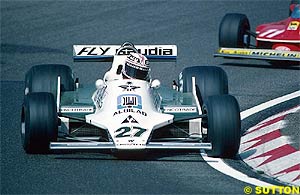 Brawn: I don't know whether it has made any difference to Michael. Even when his teammate was well behind he still pushed very hard. I don't think there is any difference in the effort or commitment that Michael is showing, I think he has always had tremendous commitment.
Brawn: I don't know whether it has made any difference to Michael. Even when his teammate was well behind he still pushed very hard. I don't think there is any difference in the effort or commitment that Michael is showing, I think he has always had tremendous commitment.
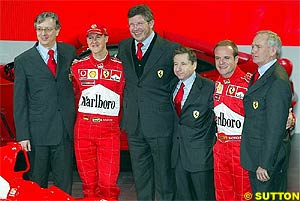 Brawn: There have been one or two times this year where the car has had a little problem and we have managed to manage it from the pit wall or manage it with some settings which have coped.
Brawn: There have been one or two times this year where the car has had a little problem and we have managed to manage it from the pit wall or manage it with some settings which have coped.
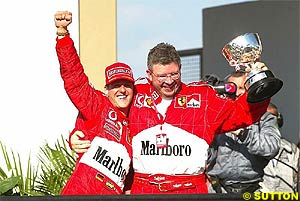 But each part has its own lifetime. Exhausts are new for the race while suspension systems tend to stay on the car for the whole weekend as they are designed to last a lot longer. It is a precise design, and something that the team has honed over years of gelled participation. Some say that Ferrari are as much as half a year ahead. Does Brawn?
But each part has its own lifetime. Exhausts are new for the race while suspension systems tend to stay on the car for the whole weekend as they are designed to last a lot longer. It is a precise design, and something that the team has honed over years of gelled participation. Some say that Ferrari are as much as half a year ahead. Does Brawn?
Please Contact Us for permission to republish this or any other material from Atlas F1.
|
Volume 8, Issue 29
Atlas F1 Exclusive
The Twelve Million Dollar Man
Interview with Ross Brawn
A Weekend with the Dennises
Articles
Giancarlo Fisichella: Through the Visor
Jo Ramirez: a Racing Man
French GP Preview
The French GP Preview
Local History: French GP
France Facts, Stats and Memoirs
Columns
The French & German GP Quiz
Bookworm Critique
Elsewhere in Racing
The Grapevine
> Homepage |